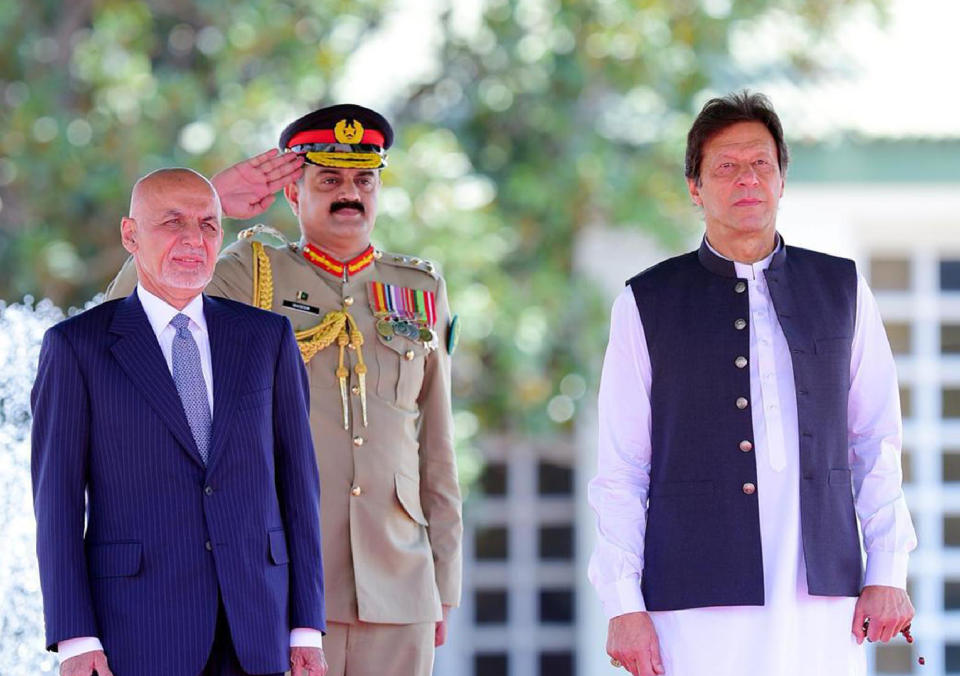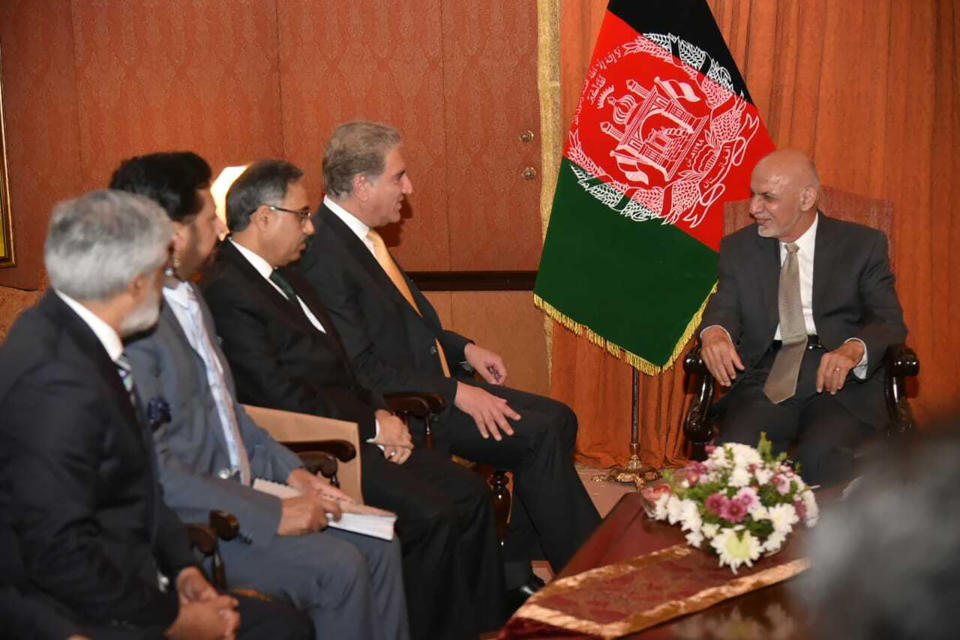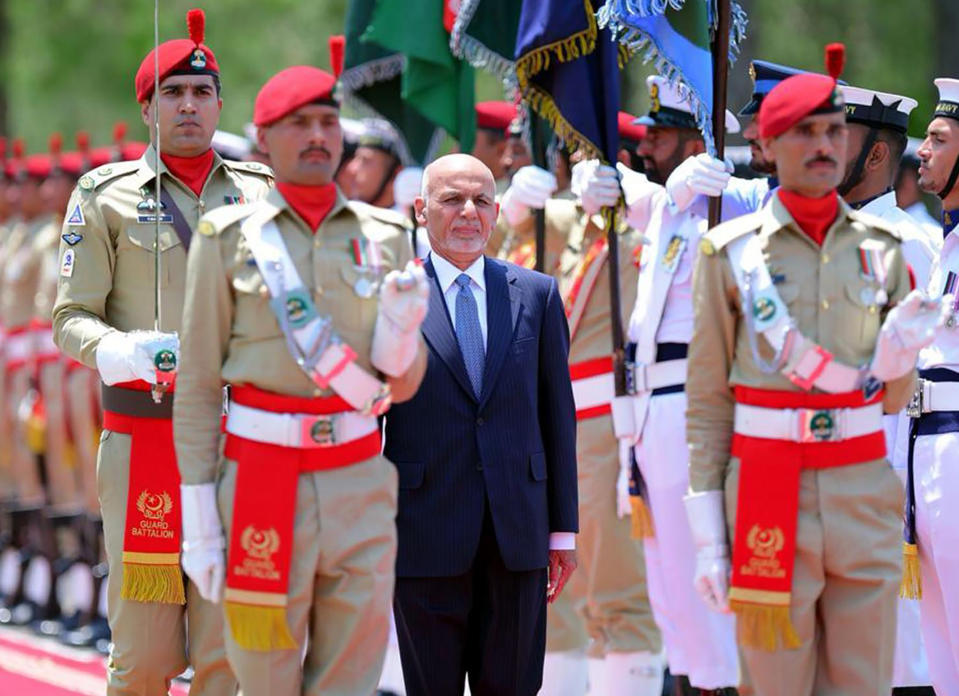Afghan president visits Pakistan, talks peace, renews ties
ISLAMABAD (AP) — Afghanistan's president Thursday praised Pakistan's efforts to advance the peace process in the region as he reached out to Islamabad for help in bringing the Taliban to the negotiating table with the Kabul government, Pakistani officials said.
Ashraf Ghani's remarks came at the start of a two-day visit to Pakistan, his first since elections that brought Prime Minister Imran Khan to power last year. The visit is also seen as an attempt by Ghani to reset the often-strained relationship between the two neighbors amid the stalled peace push with the Taliban.
Ghani arrived in Islamabad a day after U.S. Secretary of State Mike Pompeo visited Kabul, where he said Washington was hopeful of a peace deal before Sept. 1. His visit also came after dozens of Afghan political leaders — but no Taliban representatives — attended a peace conference in Pakistan last week to pave the way for further Afghan-to-Afghan dialogue. Pakistan has facilitated ongoing peace talks between Washington and the Taliban as U.S. envoy Zalmay Khalilzad tries to find a negotiated exit to the 17-year war in Afghanistan.
Ghani on Thursday first met with Foreign Minister Shah Mahmood Qureshi before holding a one-on-one meeting with Khan.
During his meeting with Qureshi, the Afghan president thanked Islamabad and "praised Pakistan's role in the peace process," according to a Foreign Ministry statement.
Later, he met with Khan in his sprawling office.
According to a government statement, the two leaders "agreed to open a new chapter of friendship and cooperation between Pakistan and Afghanistan, based on mutual trust and harmony for the benefit of the two peoples and countries and for advancing the cause of peace, stability and prosperity in the region."
It said Ghani and Khan also agreed that enduring peace in Afghanistan would bring rich economic dividends to both the countries.
It said Khan "reaffirmed Pakistan's commitment to support the Afghan peace process as a shared responsibility." It quoted Khan as saying that Pakistan supports a result-oriented intra-Afghan dialogue.
Ghani was also scheduled to meet with President Arif Alvi before traveling to the eastern city of Lahore to attend a gathering of businessmen.
He met with Khan ahead of the next round of talks Saturday between the Taliban and Khalilzad in Qatar, where the insurgents maintain a political office.
Ghani was expected to meet with Pakistan's army chief Gen. Qamar Javed Bajwa, who is believed to have played a key role in arranging talks between Khalilzad and the Taliban in recent month
Since being appointed in September, Khalilzad has met with all sides, including the Taliban, Afghan officials and Pakistan's political and military leaders. The Taliban currently control nearly half of Afghanistan, and are more powerful than at any time since the 2001 U.S.-led invasion.
The Taliban have refused to talk directly with Kabul, considering it a U.S. puppet. The insurgents, however, say they will sit down with any Afghan, even a government official, but as an ordinary citizen and not as a government representative.
More than 2,400 U.S. service personnel have died in Afghanistan since the U.S.-led coalition invaded in October 2001 to oust the Taliban and hunt down al-Qaida chief Osama bin Laden following the Sept. 11, 2001, attacks on the United States.
On Thursday, the Pentagon announced the identities of two soldiers killed in combat on Wednesday in Uruzgan province. They were 32-year-old Army Master Sgt. Michael B. Riley and 24-year-old Army Sgt. James G. Johnston. The Pentagon said both men died of wounds sustained from small arms fire while engaged in combat operations. No other details were provided.
An earlier attempt at restart Afghan-to-Afghan talks was scuttled after neither side could agree on the list of participants.
Ghani is convinced that Pakistan wields considerable influence over the Taliban and can play a role in arranging direct talks with his government. Islamabad says its influence over the militant Islamic movement is overstated.
Khan has been a strident critic of Islamabad's previous participation in Washington's so-called war on terror. However, he promised after winning the polls last July that his government would be "partners in peace," and since then, has said Islamabad would do whatever is needed for the success of the peace process.
___
Associated Press writer Robert Burns in Washington contributed to this report.




